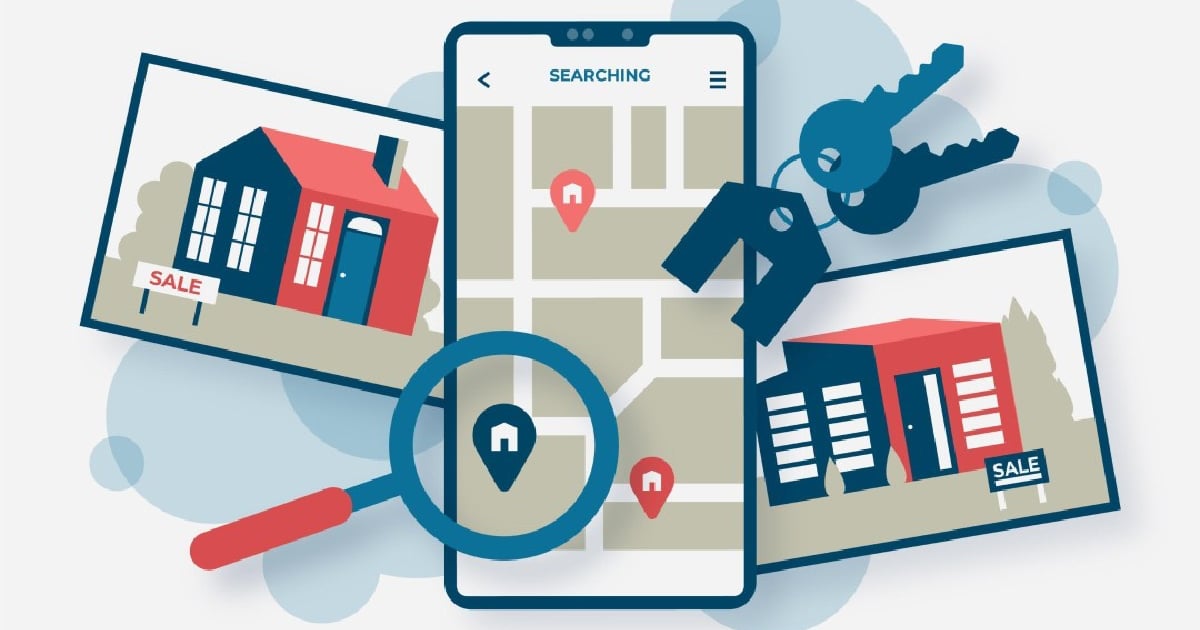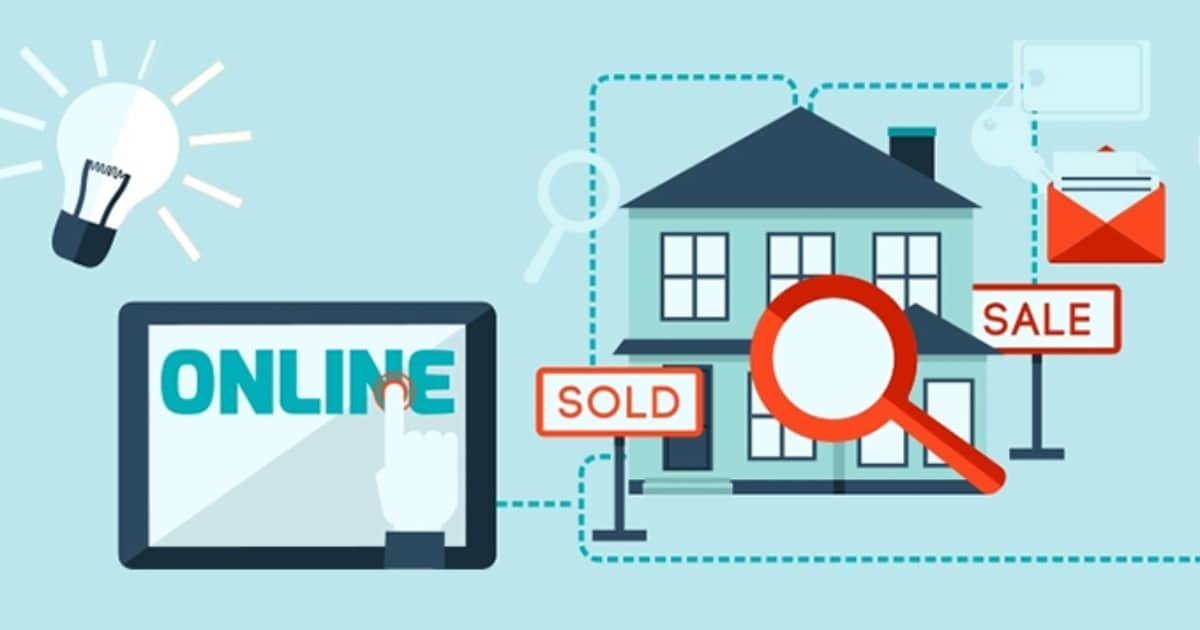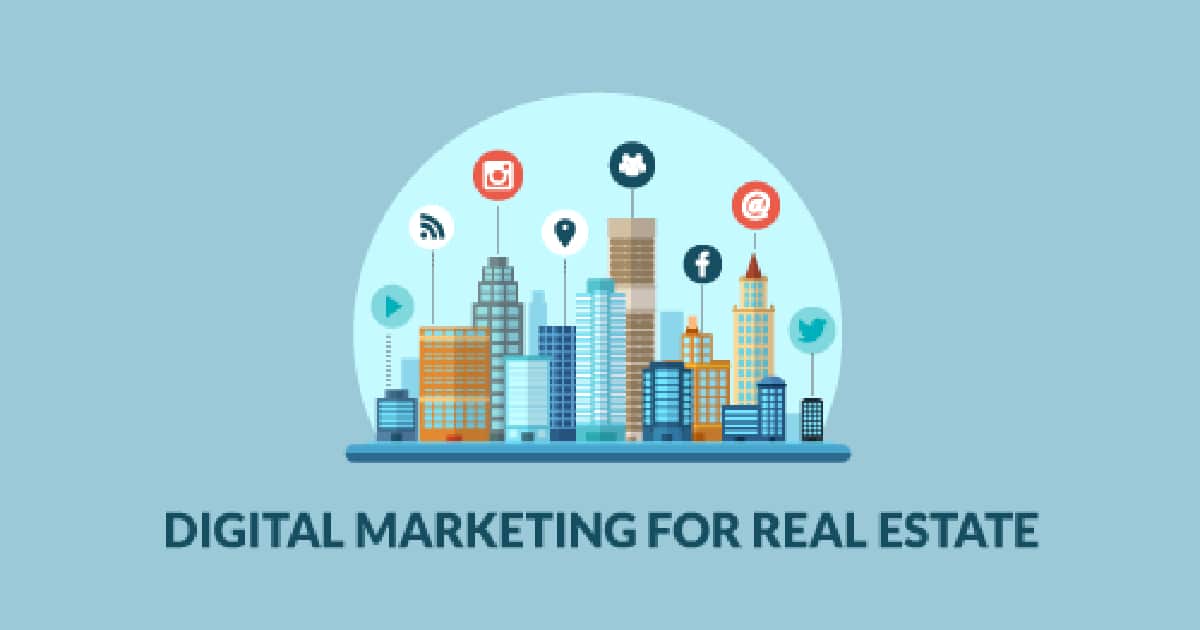The internet has completely transformed how we search for and buy real estate. According to the National Association of Realtors, 95% of home buyers use the internet in their home search. With the majority of home buyers starting their search online, having an effective digital marketing for real estate strategy is crucial to reach this tech-savvy audience.
This guide will walk you through the most important digital marketing strategies and tools specifically for the real estate industry. Implementing these strategies can help you generate more leads, close more deals, build your brand online, and stay ahead of the competition. Let’s get started!
Why Digital Marketing For Real Estate is Important

Here are some of the key reasons why digital marketing has become so essential for the real estate industry:
Most buyers start their search online – Studies show that 9 out of 10 buyers now begin their search for properties on the internet. Digital marketing allows you to connect with buyers when they are actively searching and researching homes online.
Increased visibility – With so many potential buyers online, digital marketing gives your real estate business the visibility it needs to reach a massive audience and stand out from the competition.
Flexibility to target specific audiences – Digital platforms allow you to target your messaging and listings to your ideal buyers based on demographics, interests, location and more.
Measurability – You can track and measure the results of your digital marketing campaigns, like website traffic, leads, and sales activity. This makes it easier to calculate ROI and refine what works.
Cost-effective – Digital marketing provides a higher return on investment than traditional marketing. Less expensive campaigns like SEO and social media can generate significant exposure.
Ability to keep pace with trends – The real estate market is fast-paced. Digital marketing allows you to stay nimble, test new strategies quickly, and capitalize on the latest real estate trends.
In short, digital marketing levels the playing field by giving small, local real estate businesses the same reach as large brokerages. It provides affordable and effective tools to engage buyers, generate quality leads, and boost sales.
Top Digital Marketing Strategies for Real Estate
Now let’s explore some of the best digital marketing channels and tactics you can use to promote your real estate business:
Search Engine Optimization
Search engine optimization (SEO) helps your real estate website and listings appear higher in search engine results pages (SERPs) when buyers search for terms related to your services and listings. Higher rankings equal increased visibility and website traffic.
Here are some key SEO tips for real estate:
Optimize pages and listings with keywords potential buyers search like “Chicago real estate agent”, “Miami luxury homes”, or your specific neighborhood names.
Create content that targets these keywords, including blogs, FAQs, testimonials, and area guides.
Include your location in page titles, content, and metadata to improve local SEO rankings.
Get high-quality backlinks from other relevant websites to boost authority and rankings.
Make sure your site is mobile-friendly and loads quickly. Slow sites get penalized by search engines.
Check search results frequently for your main keywords and tweak pages as needed to improve rankings.
Content Marketing
Content marketing involves consistently publishing valuable, relevant content to attract and engage potential buyers. Useful content improves your SEO and also demonstrates your real estate expertise.
Types of content to create:
Blog posts – Write in-depth articles on topics like staging tips, real estate agent advice, neighborhood guides, market updates, and more.
Videos – Create video walkthroughs of listings, interview agents, provide market insights, and give home-buying tips.
Infographics – Design infographics with real estate statistics, buying guides, home price comparisons, and other visual data.
Podcasts – Launch a real estate podcast sharing insider tips, featuring lively discussions, and interviewing industry experts.
Social media content – Post photos, market facts, quick tips, polls, and other engaging content frequently on social platforms.
The key is to post content regularly, promote it across channels, and make it helpful for buyers during every stage of their journey.
Social Media Marketing
Promoting your brand and listings on social media platforms is essential for reaching buyers where they spend time online.
Key networks to leverage:
Facebook – Create a Business Page to post listings, run ads, and engage followers. Target ads to homeowners and those interested in real estate.
Instagram – Post property photos, behind-the-scenes stories, and realtor highlights. Use relevant hashtags like #realestate and location tags.
YouTube – Upload listing videos, vlogs, and other real estate content. Embed videos on your website to boost SEO too.
Pinterest – Create boards for home styles, remodeling tips, destinations, and more. Link to your website content.
Twitter – Share market updates, real estate news, and blog posts. Engage with other agents and industry voices.
LinkedIn – Establish yourself as an industry thought leader. Share content and join relevant groups.
Nextdoor – Introduce yourself as the go-to neighborhood realtor where you have listings.
Post consistently, respond promptly, and monitor social media listening tools for any brand mentions. Paid social ads also help expand your reach.
Email Marketing
Email marketing provides a direct line of communication with buyers who have opted-in to receive your messages. Use email to:
- Send listings that match subscribers’ search criteria
- Promote open house events, new listings, and other updates
- Nurture leads with useful content to build relationships over time
- Retarget past customers/leads and invite referrals
Focus on sending valuable, relevant content rather than overly promotional messages. Personalize and segment your lists to improve open and click-through rates.
Paid Advertising
There are several effective paid advertising channels:
| Channel | Description |
|---|---|
| Pay-Per-Click (PPC) | Advertise directly on Google and Bing through pay-per-click ads. You only pay when someone clicks your ad. |
| Social Media Ads | Create ads on Facebook, Instagram, Twitter, LinkedIn and other platforms. Target users based on demographics, interests, and behaviors. |
| Display Ads | Place ads on real estate websites, news sites, and other online publications. Use remarketing ads to reach visitors after they left your website. |
Paid ads complement your organic strategies with an extra push to reach active buyers. Aim for a marketing mix over time for the best ROI.
Retargeting
Retargeting ads target people who have already visited your website by showing them your ads as they browse other sites. This reminds them about your brand and listings at multiple touchpoints in their buyer’s journey.
Some examples of how to retarget effectively:
Create remarketing lists in Facebook, Google and other platforms based on site visitors.
Show previous visitors display ads for new relevant listings as they visit other websites.
Target visitors who searched listings on your site but didn’t contact you yet.
Send one-time emails inviting visitors back to see new content.
Customize ads and offers based on what they viewed on your site.
Retargeting helps turn cold website visitors into hot leads by keeping your brand top of mind.
Marketing Automation
Marketing automation uses software to automate repetitive marketing tasks to more efficiently nurture leads and customize the buyer’s journey. Some key features include:
Email campaigns: Send timed autoresponder email series to subscribers.
Lead scoring: Assign points based on lead behavior to focus on hot leads first.
CRM Integration: Track lead activity from first click to sale in one centralized CRM.
Behavior tracking: See every interaction a lead has with your site and marketing.
Landing pages: Create tailored landing pages and forms to capture leads.
Reporting: Measure the results of campaigns and see ROI.
With so many moving parts in real estate marketing, automation helps streamline processes and deliver more personalized, timely communication at scale.
Tips for Effective Real Estate Digital Marketing

Here are some important tips to ensure your digital marketing strategies are as effective as possible:
Focus on optimizing for local SEO to attract nearby home buyers searching for properties in your city or neighborhood.
Leverage high-quality photography and video as this is what buyers respond to most online. Avoid blurry cell phone pics!
Highlight what makes your properties and services unique compared to competitors to stand out. Show your value proposition.
Be consistent with posting on social media and your site’s blog to stay top of mind with buyers.
Make content optimized and mobile-friendly since most real estate browsing happens on smartphones.
Use call tracking numbers on ads to measure the effectiveness of different campaigns.
Personalize content and messaging using segmentation and lead intelligence data. Generic outreach is ignored.
Provide value at every stage from awareness to closing. Meet buyers’ changing needs throughout their journey.
Focus on converting site visitors into leads by making calls-to-action, forms, and contact info very visible.
Experiment with different ad formats and placements for paid ads. See what resonates best with your target audiences.
Monitor and adjust based on performance data. Double down on what works and cut ineffective methods.
Measuring the Success of Real Estate Digital Marketing
It’s crucial to track the right success metrics for your digital marketing efforts. Here are some key performance indicators to measure:
Traffic – How many visits, unique visitors, and page views does your site get monthly? Is it trending up over time?
Lead volume – How many organic leads are captured from website forms and calls monthly? How about from paid ads?
Lead quality – What % of leads turn into prospects and closed buyers? How much revenue do they represent?
Rankings – What keywords or pages are ranking on the first page for relevant searches? How have rankings changed month-over-month?
Engagement – What is your social media and email engagement like? (Likes, shares, opens, clicks, etc.)
Conversions – What is the conversion rate from website visitors to leads to closings? What’s the value of conversions?
ROI – What is the return on investment (ROI) for your digital marketing spend?
Analyze these KPIs frequently and tie results back to campaigns to see what’s working and what needs adjustment. Use analytics platforms like Google Analytics, Google Ad Manager, and social media analytics.
Implementing a strong digital marketing strategy is required for real estate agents and agencies to thrive in today’s online-first real estate landscape. The tactics covered in this guide, especially local SEO, social media marketing, paid ads, and content marketing, can help you stand out from the competition and connect with today’s tech-enabled buyers.
Remember to always optimize for conversions by turning passive website visitors into hot leads ready to buy or sell. Make it easy for potential customers to contact you from every online touchpoint. Use analytics to refine your strategy over time, doubling down on the platforms and campaigns that deliver results.
With smart digital marketing foundations in place, you can build your real estate brand, attract more buyers and sellers, and win more listings and sales in your market.
FAQs
A good starting budget is 10-15% of your gross commission income. Track ROI and optimize spend across channels for the best returns.
Posting 1-2 times per day on each platform is ideal for real estate. Mix up content types including listings, market facts, agent highlights, and more.
Create video walkthroughs for your high-end, unique, or strategically located listings to attract more buyers. Focus on properties most likely to go viral.
Focus on on-page and local SEO optimization, create engaging content, promote your site, and invest in paid advertising. Frequent blog posts and social media activity also help.
Use UTM campaign tracking, call tracking numbers, CRM lead reports, and analytics platforms to tie leads and sales back to campaigns
Display listings they viewed, special offers, new matching inventory, and invites to download content or contact you to keep them engaged.
Related article
 Anas is our go-to copywriter with a knack for crafting persuasive and high-converting eCommerce landing pages. His passion for words and understanding of consumer psychology helps turn visitors into loyal customers. When he's not refining his copy, Anas enjoys exploring the latest digital marketing trends and experimenting with new writing techniques. His blend of creativity and strategic thinking makes him an indispensable part of our energetic team.
Anas is our go-to copywriter with a knack for crafting persuasive and high-converting eCommerce landing pages. His passion for words and understanding of consumer psychology helps turn visitors into loyal customers. When he's not refining his copy, Anas enjoys exploring the latest digital marketing trends and experimenting with new writing techniques. His blend of creativity and strategic thinking makes him an indispensable part of our energetic team.












